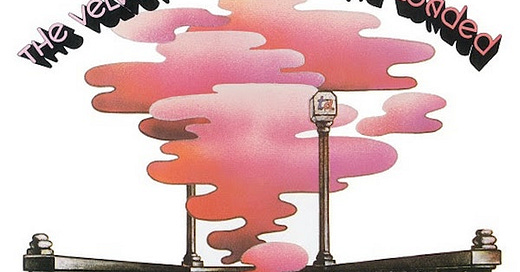The Velvet Underground’s John Cale was a founding band member and had been instrumental in shaping the avant-garde sound on their first two records. Cale's background in classical music and experimental art and his work with minimalist composer La Monte Young significantly influenced the band's early sound, including bringing the viola he played in Young’s Theatre of Eternal Music. While the cast of New York characters is the work of singer-songwriter Lou Reed, Cale pushed out-there production techniques, dissonance and droning on the first two records. This can be heard on the likes of ‘Venus in Furs’ and ‘The Black Angel's Death Song’ on the first record and is all over the second.1
However, the creative tension between Cale, wanting to push back the boundaries of what the band were recording, and Reed, who wanted to move the band towards accessibility and success through melody, bubbled over, and Reed offered an ultimatum; He goes, or I go. Sterling Morrison and drummer Mo Tucker sided with Reed.
Tucker is said to have stated;
When John left, it was really sad. I felt really bad. And of course, this was gonna really influence the music, 'cause, John's a lunatic (laughs). I think we became a little more normal, which was fine, it was good music, good songs, it was never the same though. It was good stuff, a lot of good songs, but, just, the lunacy factor was... gone.
Cale was replaced with Boston musician, Doug Yule, and this change in personnel changed the band’s output over their following two records.
Their third record, The Velvet Underground (1969), and then 1970’s Loaded see the group move towards that more accessible, melodic sound that Reed was interested in. Yule sings on both album’s openers, ‘Candy Says’ and ‘Who Loves The Sun’ and six songs in total across them. Almost all the songs on Loaded are marked by the more polished playing of instruments and cleaner, almost radio-friendly, production. With Reed now the sole songwriter, his stories of the seedy underbelly of NY are even more prominent than before. Yule’s playing and singing even give a country twang to ‘Lonesome Cowboy Bill’, but it is on the closing track, ‘Oh! Sweet Nuthin’’ that the band went far from where Cale was standing.
Yule dominates the track. He sings lead vocals, plays the guitar solo, and performs his regular bass and organ duties. With Tucker off on maternity duties, he even manages to rope his young brother, Billy Yule, in to play the drums on the song. We are still treated, in the lyrics, to a dry run for Reed’s solo songs like ‘Walk On The Wild Side’2 on his album Transformer.3 The cast in the song are down-and-outs, and while we focus on their lack of material possessions, places to live, realtionships4 or directions to their lives as the song starts up, we might think we are asked to feel sorry for them or sad on their behalf. We aren’t. As we get towards the song’s climax, we celebrate them. They are making a fist out of a pile of dust; they’ve abandoned what they did have, ended up with nothing, and now get to start from scratch. Reed sees the positives in that; by the song’s end, we do too.
The other noticeable element of the song is that it only uses three chords (C, Bb and F) to deliver a polished, radio-friendly song that, while not a single on release, has gone on to be considered as one of the band’s more popular tunes. While Reed and Yule sang on the record that it was the beginning of a new age, it could be argued that ‘Oh! Sweet Nuthin’’ was, in fact, the beginning of a New Wave.
But not for the band; before Loaded saw release in Europe in 1971, Reed had left, and Yule took over as lead singer and songwriter. Tucker and Morrison would follow suit before too long, and the band’s 1973 album, Squeeze, might as well have been called The Ship of Theseus or Sweet 7.
Including the lead vocal on the tale of Waldo Jeffers missing his girlfriend on ‘The Gift’.
At this point, the characters in his lyrics haven’t progressed to being identifiable real-life persons as they would do by the middle of the decade.
Robots in disguise.
There’s more than a hint that Joana Love may not be lamenting a string of failed relationships but rather a non-stop succession of transactions for her late-evening company.





Thanks for this essay. Great reminders. As someone who works in music today with younger musicians who revere this kind of "roots" music I watch as they try to figure it all out. Times are so very different to say the least. But the large themes are quite similar.
Such a great song. I don't see it mentioned very often, though. Glad to see it highlighted here. I was caught off guard this week while listening to The Sand Pebbles "Pleasure Maps" album. The last track began and I was like "this song sounds familiar." It was "Oh! Sweet Nuthin'".